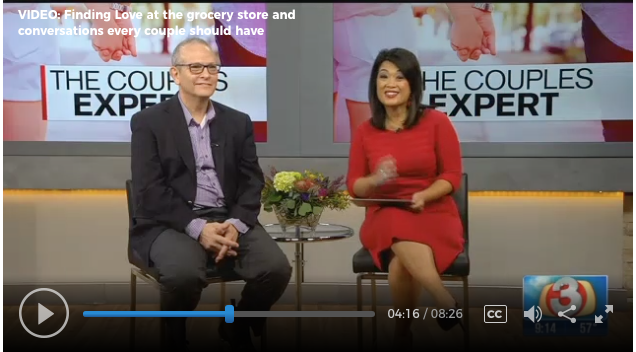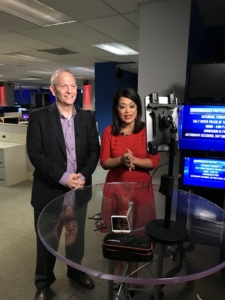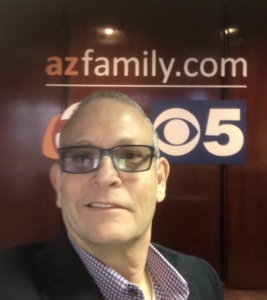
 Stuart was invited to be a guest on Good Morning Arizona this morning for Valentine’s Day to share some tips for a strong and lasting relationship.
Stuart was invited to be a guest on Good Morning Arizona this morning for Valentine’s Day to share some tips for a strong and lasting relationship.
Before Stuart went on-air at Channel 3, he did a Facebook Live to answer viewer questions. See the replay here:
Happy Valentine's Day! Need love advice? The couple's expert is here to answer your questions!
Posted by azfamily 3TV CBS 5 on Wednesday, February 14, 2018
Also read Stuart’s Guest Blog here: http://www.azfamily.com/story/37502465/conversations-every-couple-needs-to-have
By Stuart Fensterheim, LCSW
PHOENIX (3TV/CBS 5) – My work in couple’s therapy is based on the theory that we all have certain attachment needs. That is, what we need from our partner in a relationship to feel loved and important.
We need to feel that our presence truly matters to our partner and that we can trust and rely on them to meet their attachment needs.
[SPECIAL SECTION: GMAZ]
My workshop based on the book “Hold Me Tight,” by Dr. Susan Johnson, covers conversations that couples need to have to cement their connection to one another and to identify and deal with those issues that might otherwise come between them.
Here are six conversations that every couple should have.
In the first of six conversations, couples identify negative and destructive remarks in order to get to the root of the problem and figure out what each other is really trying to say. We eliminate assumptions and quickly get to the heart of the matter of what is causing the disconnection and conflict in their lives.
1. Recognizing demon dialogues
Demon dialogues are the name for the negative and destructive cycles of conflict that couples can get stuck in. These patterns repeat and escalate until communication is almost impossible due to negative interpretations, triggers and responses.
There are three kinds of demon dialogues:
- Find the bad guy – This is the pattern where partners become entrenched in mutual blame and the situation escalates until they are like combatants in a boxing match trading accusations and verbal blow for blows. This pattern is hard to maintain for very long.
- Freeze and flee – This is when both partners are emotionally overwhelmed and exhausted; feeling hopeless, they both withdraw, shutting down emotionally and freezing each other out. No one is putting forth any effort in the relationship at this point.
- Protest polka – This is the most common and the one that when caught up usually leads to divorce. We are in need of emotional connection and the fear of rejection and abandonment is part of the reason. Even if we know that sometimes we make things worse by criticizing or shutting our partner out we don’t seem able to switch off our desire for closeness. When one partner pursues with demands and criticism this puts the other partner on the defensive. This can overwhelm the other partner which leads them to withdraw and isolate. The partner feels abandoned by this withdrawal but both partners in actuality are protesting the loss of connection and needing emotional closeness.
2. Finding the raw spots
Here, each partner learns to look beyond immediate, impulsive reactions to figure out what raw spots or triggers are being hit. With that awareness comes the understanding of how and why we get triggered and how even a seemingly small issue can get blown up and become unmanageable.
This can be a radical shift in emotional tone. Responses seem out of proportion. Partners feel off balance and go into survival mode. There’s no guidance system, it gets scary and out of control.
3. Revisiting a rocky moment
Our third conversation provides a platform for de-escalating,
Repairing the rifts and conflicts in a relationship and building emotional safety. When couples can sort through some of these difficult moments and see that their partner is not the enemy, the perspectives begin to change and so do the conversations.
After learning some of the skill with the daily dialogue conversation, we take a situation that already has occurred and do it all over again using attachment language that allows for a healthy interaction. This gives the partner what they truly need to have the discussion in a way that facilitates closeness.
4. Hold me tight
The heart of the program: This conversation moves partners into being more accessible, emotionally responsive and deeply engaged with each other. Once couples learn that their partner is there to love and support them, they’re more willing to open themselves up, be more vulnerable and emotionally available to each other.
5. Forgiving injuries
Understanding and forgiving the injuries that create a deep negative wound. Relationship traumas involve disconnection at moments of high need.
These injuries destroy safety and trust between the partners and create feelings of abandonment and betrayal. This typically occurs in times of us being most fragile. These injuries can create a very deep devastating wound that can have a huge impact how each partner sees the other and determines whether they can believe their partner is viewed as a loving partner or someone they need to protect themselves from. These injuries, with help, may be repaired. Knowing how to forgive this injury requires professional help and vulnerability so the partners truly understand what the real injury is, empowering the couple to strengthen their bond. This is facilitated by a true apology that follows these steps:
- The injured partner shares the true extent of their pain to their partner.
- The other partner accepts the responsibility and acknowledges the hurt they’ve caused.
- The injured partner reveals the extent of the damage caused without blaming their partner.
- The other partner shows their sorrow at causing their partner’s pain, shows true remorse and offering a sincere apology.
- The injured partner can now ask for comfort. The disconnected can be healed.
- The other partner attempts to provide the comfort that is missing to the injured partner.
- Then together they begin to restore their connection that was missing.
6. Keeping your love alive
This last conversation is built on the understanding that love is a continual process of losing and finding an emotional connection. It asks couples to be deliberate and mindful of maintaining a connection.
My workshop is not the end of the story. On the contrary, this is only the beginning of the journey for couples to learn how to connect in a new way. After they leave the workshop is when they set off on the road to true connection. There are many more conversations to be had.
We start with these conversations because they contain the basis, the foundation for a great relationship.
Nothing is that simple, however, and we know that the process is not a linear one. The tools they’ve been given are only the beginning. It’s up to the couple to use those tools to create the love story they’ve always wanted to have with their partner.
Their unique relationship, their happy ending is the one that they create together by being loving and kind and attentive to their partner’s needs every single day.
 Stuart Fensterheim, LCSW, helps couples overcome the disconnection in their relationships. As an author, blogger and podcaster, Fensterheim has helped couples around the world experience a unique relationship in which they can feel special and important, confident in knowing they are loved deeply and that their presence matters.
Stuart Fensterheim, LCSW, helps couples overcome the disconnection in their relationships. As an author, blogger and podcaster, Fensterheim has helped couples around the world experience a unique relationship in which they can feel special and important, confident in knowing they are loved deeply and that their presence matters.
His weekend workshop, Two Days: Seven Conversations, has become a popular venue for many to set off on their journey of connectedness.
The Couples Expert Podcast consists of weekly provocative conversations offering the perspectives and insight of experts from a variety of relationship-related fields. Fensterheim also offers daily relationship video tips on The Couples Expert YouTube channel and by subscription in Stuart’s Daily Notes.
Fensterheim is happily married and a devoted father of 2 daughters. He lives and works in Scottsdale, Arizona.
Copyright 2018 KPHO/KTVK (KPHO Broadcasting Corporation). All rights reserved.
Subscribe to My YouTube Channel
Ask Me a Question
If you have a question, comment, thought, or concern, feel free to comment below. We’d love to hear from you!

